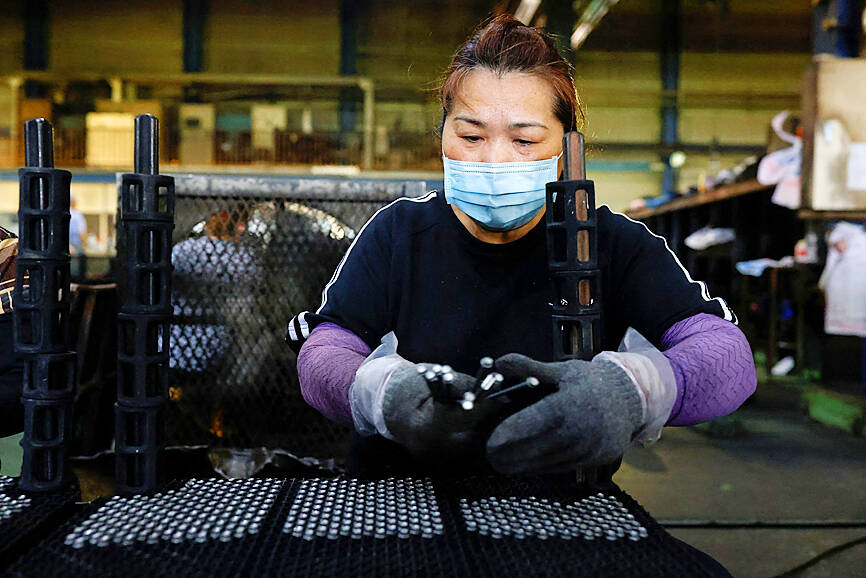The business climate monitor for local manufacturing in February signaled “blue” for a fourth consecutive month, reflecting declines in the petrochemicals, plastic, metal and electronics sectors, while auto components held firm, the Taiwan Institute of Economic Research (TIER, 台灣經濟研究院) said yesterday.
The business composite index edged up 0.85 points to 10.49, stuck in a recessionary state, as selling prices shed another 0.29 points on the back of firms cutting prices to secure orders, while the operating environment, cost, demand and input showed little improvement, the Taipei-based think tank said.
TIER uses a five-color spectrum to capture the industry’s movements, with “red” indicating a boom, “green” suggesting a steady state and “blue” signifying a downturn. Dual colors indicate a transition to a better or worse condition.

Photo: Ann Wang, Reuters
China’s reopening gave local firms a breather, but with end-market demand remaining soft in the US and Europe, inventory adjustments continued, hampering local manufacturers’ willingness to buy and prepare materials used in production, the institute said.
Against this backdrop, the ratio of companies whose business contracted dropped from 73.52 percent in January to 43.34 percent in February, while companies whose business was flat increased from 3.96 percent to 13.1 percent, it said.
Only 1.46 percent of companies reported that business increased and none experienced a boom, it added.
Textile and paper product makers reported a decline in business, as brand customers stuck to cautious inventory management and refrained from placing orders, it said.
Petrochemical suppliers found support in selling prices after local firms reduced capacity by conducting annual maintenance, it said.
Nevertheless, the entry of new competitors and slack global demand translated into a double-digit percentage decline in orders, it said.
Metal product suppliers fared slightly better, but remained weak overall, as downstream customers prioritized digestion of inventories, such as steel, it said.
The conservative business outlook weighed on machinery equipment providers, although some benefited from technology upgrades and capacity expansion by local semiconductor firms, it said.
The business monitor flashed “yellow-blue” for local electronics firms, as servers and networking equipment picked up due to demand from China, the institute said, adding that it did not see a recovery in demand for flat panels, computers and peripheral products.
Makers of transportation tools bucked the downtrend and reported steady business, thanks to the release of new vehicle models and an easing of the chip supply crunch, it said.
As a result, the number of new car license plates spiked 35.18 percent in January to 32,800 in February, it said.

Macronix International Co (旺宏), the world’s biggest NOR flash memory supplier, yesterday said it would spend NT$22 billion (US$699.1 million) on capacity expansion this year to increase its production of mid-to-low-density memory chips as the world’s major memorychip suppliers are phasing out the market. The company said its planned capital expenditures are about 11 times higher than the NT$1.8 billion it spent on new facilities and equipment last year. A majority of this year’s outlay would be allocated to step up capacity of multi-level cell (MLC) NAND flash memory chips, which are used in embedded multimedia cards (eMMC), a managed

CULPRITS: Factors that affected the slip included falling global crude oil prices, wait-and-see consumer attitudes due to US tariffs and a different Lunar New Year holiday schedule Taiwan’s retail sales ended a nine-year growth streak last year, slipping 0.2 percent from a year earlier as uncertainty over US tariff policies affected demand for durable goods, data released on Friday by the Ministry of Economic Affairs showed. Last year’s retail sales totaled NT$4.84 trillion (US$153.27 billion), down about NT$9.5 billion, or 0.2 percent, from 2024. Despite the decline, the figure was still the second-highest annual sales total on record. Ministry statistics department deputy head Chen Yu-fang (陳玉芳) said sales of cars, motorcycles and related products, which accounted for 17.4 percent of total retail rales last year, fell NT$68.1 billion, or

In the wake of strong global demand for AI applications, Taiwan’s export-oriented economy accelerated with the composite index of economic indicators flashing the first “red” light in December for one year, indicating the economy is in booming mode, the National Development Council (NDC) said yesterday. Moreover, the index of leading indicators, which gauges the potential state of the economy over the next six months, also moved higher in December amid growing optimism over the outlook, the NDC said. In December, the index of economic indicators rose one point from a month earlier to 38, at the lower end of the “red” light.

MediaTek Inc (聯發科) shares yesterday notched their best two-day rally on record, as investors flock to the Taiwanese chip designer on excitement over its tie-up with Google. The Taipei-listed stock jumped 8.59 percent, capping a two-session surge of 19 percent and closing at a fresh all-time high of NT$1,770. That extended a two-month rally on growing awareness of MediaTek’s work on Google’s tensor processing units (TPUs), which are chips used in artificial intelligence (AI) applications. It also highlights how fund managers faced with single-stock limits on their holding of market titan Taiwan Semiconductor Manufacturing Co (TSMC, 台積電) are diversifying into other AI-related firms.